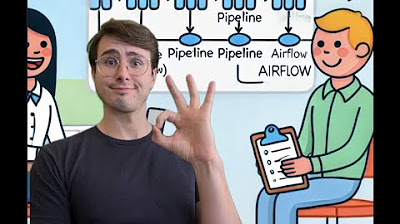NOC Engineer interview questions | Network Engineering
Summary
TLDRIn this informative video, Ali shares his extensive experience in Network Operation Center (NOC) engineering, offering valuable insights for aspiring NOC engineers preparing for interviews. He covers essential topics such as understanding the OSI model, TCP/IP, UDP, and troubleshooting techniques. Ali emphasizes the importance of a troubleshooting mindset, collaboration, and quick thinking under pressure. He also addresses common interview questions and provides guidance on how to approach them, ensuring viewers are well-prepared for their NOC engineering interviews.
Takeaways
- 😀 The speaker, Ali, has been busy with work and makes videos as a side hobby to help people with questions.
- 🔍 Ali's previous video was about the life of a NOC (Network Operation Center) engineer, which sparked many interview preparation inquiries.
- 🔧 Ali shares his decade-old experience with NOC engineering interviews to assist those preparing for similar roles.
- 📝 NOC stands for Network Operation Center, where engineers monitor and troubleshoot networks, with varying scopes depending on the company.
- 💡 The key to NOC interviews is demonstrating a troubleshooting mindset, as this is the primary skill NOC engineers are paid for.
- 👨🏫 Ali suggests replicating problems in a sandbox environment and using packet captures as part of the troubleshooting process.
- 📈 Understanding the OSI model's seven layers is crucial for NOC engineers, as it dictates where to start troubleshooting based on the issue.
- 🤝 Teamwork is essential in a NOC environment, with engineers often needing to guide junior staff or seek help from seniors.
- 🛠 Technical knowledge of networking protocols, such as TCP/IP, UDP, and the functions of network devices like switches, is expected.
- 📋 Ali emphasizes the importance of knowing how to collect the right logs and traces to effectively troubleshoot network issues.
- 🗣️ Behavioral questions are also part of the interview process, testing candidates on their problem-solving approach and team player attitude.
Q & A
What does NOC stand for in the context of the video?
-NOC stands for Network Operation Center, which is where network monitoring and troubleshooting are performed for a company or globally, depending on the scope of the job.
Why is the OSI model important for a NOC engineer?
-The OSI model is crucial for a NOC engineer as it provides a framework for understanding the seven layers of networking, which is essential for troubleshooting and resolving network issues at the correct layer.
What are the seven layers of the OSI model mentioned in the video?
-The seven layers of the OSI model are the Physical layer, Data Link layer, Network layer, Transport layer, Session layer, Presentation layer, and Application layer.
Why is troubleshooting a key skill for NOC engineers?
-Troubleshooting is a key skill for NOC engineers because their primary job is to identify, analyze, and resolve network issues. Having a systematic troubleshooting mindset is critical for effective problem-solving.
What does the acronym TCP/IP stand for and why is it important for NOC engineers?
-TCP/IP stands for Transmission Control Protocol/Internet Protocol. It is important for NOC engineers as it is the fundamental communication protocol used for transmitting data over the internet, and understanding it is essential for diagnosing connectivity issues.
What is the difference between TCP and UDP as mentioned in the video?
-TCP (Transmission Control Protocol) is a connection-oriented protocol that ensures reliable data transmission, while UDP (User Datagram Protocol) is a connectionless protocol that allows for faster transmission but without the guarantee of delivery or order.
Why is being a team player important in a NOC environment?
-Being a team player is important in a NOC environment because engineers often need to collaborate, share knowledge, and provide mentorship to junior staff. Effective teamwork is crucial for managing and resolving complex network issues.
What is a proxy and why might it be used in network environments?
-A proxy is a server or application that acts as an intermediary for requests from clients seeking resources from other servers. It is used to improve security, manage network traffic, and provide access control in network environments.
What is a three-way handshake in the context of the video?
-A three-way handshake is the process of establishing a TCP connection between a client and a server, involving the exchange of SYN (synchronize), SYN-ACK (synchronize-acknowledge), and ACK (acknowledge) packets.
What does the term 'trunking' refer to in networking, as mentioned in the video?
-Trunking in networking refers to the practice of carrying multiple virtual local area networks (VLANs) over a single physical link, allowing for efficient use of bandwidth and better organization of network traffic.
How can a NOC engineer find the uptime of a Cisco router as discussed in the video?
-A NOC engineer can find the uptime of a Cisco router by using the 'show version' command in the command-line interface (CLI), which provides information about the router's operating system version and how long it has been running.
Outlines

This section is available to paid users only. Please upgrade to access this part.
Upgrade NowMindmap

This section is available to paid users only. Please upgrade to access this part.
Upgrade NowKeywords

This section is available to paid users only. Please upgrade to access this part.
Upgrade NowHighlights

This section is available to paid users only. Please upgrade to access this part.
Upgrade NowTranscripts

This section is available to paid users only. Please upgrade to access this part.
Upgrade NowBrowse More Related Video

Network Operations Centers Explained: What is a NOC?

How to Crack Data Engineering Interviews

LTIMindtree Interview Questions Asked on 08-10-2024 | LTIMindtree Interview Experience🔥

My ServiceNow Interview Experience:How I Got the Job in Just 5 Days!My Preparation guide & questions

Data Engineering Interview Guide! How to Get a Data Engineering Job!

Accenture 2025 Actual Interview: What Really Happened (Unexpected)
5.0 / 5 (0 votes)